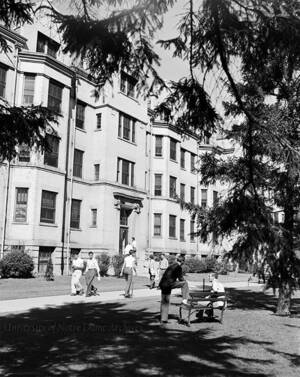Editor’s note: Eduard Adam Skendzel (1921-1999) was a linguist, historian and teacher from Grand Rapids, Michigan, who wrote this essay after a July 1941 visit to Notre Dame. A collection of his papers, chiefly concerning the history of Polish Catholics in the United States, was donated to the University of Notre Dame Archives.
On South Bend’s Notre Dame Avenue, just past the north city limits, sprawling out over the plain and down to the shores of two clear, blue, spring-fed lakes — Saint Mary’s and Saint Joseph’s — is a unique city. It is a city unlike any other in the USA. A city apart, yet it is as cosmopolitan as any from East to West. It is Notre Dame, Indiana, known scholastically as the University of Notre Dame.
To describe Notre Dame as I found it last July will be a difficult task. There is the feeling that one will do injustice to the fame of Notre Dame by omitting a few details which seem insignificant, but which actually are very important. All things being equal, however, Notre Dame is a center of active Catholic Action, a school of learning where the Catholic way of things is engraved on the hearts of youthful men. It is Our Lady’s school — Notre Dame, for it is a place of learning whose famed spirit is guided by love for the great and pure Mother of God.
The long, maple-bordered avenue that leads one to Notre Dame’s campus is an invitation for the visitor to become part of her life, part of her learning, her traditions, her legacy, and that in the fullest measure possible. Though the Notre Dame one finds today is a Notre Dame geared in wartime efficiency, a Notre Dame engaged in training thousands of youths for the great country we love, nonetheless, the rich memories of that great school seem to flourish all the more.

For a hundred years now, Notre Dame has been an apostle for the rugged and manly way of life and learning. It is here on these hallowed grounds that the Notre Dame of Fathers Sorin and Corby, of Rockne, springs outwards and around beautiful lakes. From two or three buildings, a few teachers, a dozen students, Notre Dame has burst into a university of quadrangles, of many halls and libraries, of a faculty in the hundreds and a student body in the thousands. That is Notre Dame.
And because Notre Dame was started the hard way with struggles and disappointments, it has endured and enlarged through the years. Today it stands as a most fitting memorial of the first Holy Cross Fathers, who left their dear France and braved these shores to form an institution destined to be a strength, a guide, a depository of the Catholic faith and learning in a great and flourishing America.
But for me there is a certain something about Notre Dame which makes it different from any other university in America. That intangible something which can be found only at Notre Dame is called popularly “The Spirit of Notre Dame,” the “Spirit of Our Lady.” This something makes the Notre Dame man distinct from all other college men. It is not a manner of dress, nor a manner of speaking. It is not a fanatic devotion to the “alma mater.” It is a loyalty to Catholic teaching, a tradition and culture; a loyalty to Christ, Our Brother, and to Our Lady.
To be at Notre Dame and to see the living Catholicism of it all is for me a most inspiring sight. The great domed figure of Our Lady glowing in the ray of the sun is an unforgettable sight for many a visitor. The many shrines, grottos and things Catholic that grace this veritable city are but visible memorials of the faith of Notre Dame. But to me, to see the men robed in black — the Fathers and Brothers of Holy Cross — who left home and the pleasant things of family life to devote their lives unselfishly to the care of American and Catholic youth is perhaps the most inspiring of all sights at Notre Dame. Notre Dame is built upon their sacrifice, their loyalty, their faith and their love of the Son of God and his Mother.
These are but a few thoughts on Notre Dame. There is not a single visitor who can fail to be conscious of the Notre Dame way of life. The philosophy of Notre Dame is not merely the philosophy of the world. It is the great philosophy of Our Lady, our God and his Church. It is the Catholic philosophy of life.